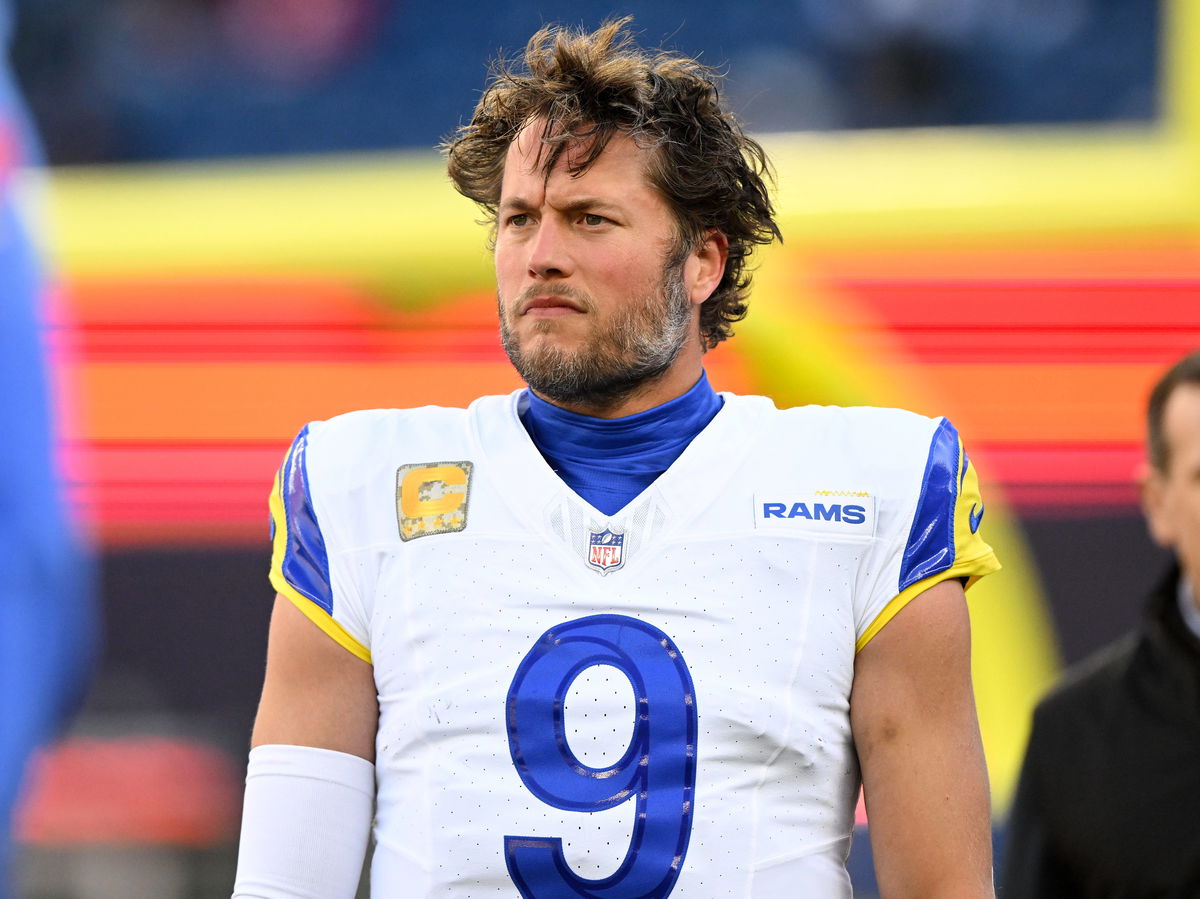
Imago
NFL, American Football Herren, USA Los Angeles Rams at New England Patriots Nov 17, 2024 Foxborough, Massachusetts, USA Los Angeles Rams quarterback Matthew Stafford 9 walks onto the field before a game against the New England Patriots at Gillette Stadium. Foxborough Gillette Stadium Massachusetts USA, EDITORIAL USE ONLY PUBLICATIONxINxGERxSUIxAUTxONLY Copyright: xBrianxFluhartyx 20241117_brf_fb7_0288

Imago
NFL, American Football Herren, USA Los Angeles Rams at New England Patriots Nov 17, 2024 Foxborough, Massachusetts, USA Los Angeles Rams quarterback Matthew Stafford 9 walks onto the field before a game against the New England Patriots at Gillette Stadium. Foxborough Gillette Stadium Massachusetts USA, EDITORIAL USE ONLY PUBLICATIONxINxGERxSUIxAUTxONLY Copyright: xBrianxFluhartyx 20241117_brf_fb7_0288
Matthew Stafford was already feeling good about 2025. Back in April, he’d sat comfortably behind the mic at Rams OTAs and gushed about his offensive line, particularly left tackle Alaric Jackson. “Just great stability,” Stafford said, praising Jackson for his grit and quiet leadership. “He brings up the nastiness to our group.” It was a big moment: Jackson had just signed a three-year, $57 million extension, locking down Stafford’s blindside and symbolizing the Rams’ commitment to a familiar front.
Watch What’s Trending Now!
So, the Rams were banking on continuity. Jackson, Rob Havenstein, Steve Avila, Kevin Dotson, and Coleman Shelton had built chemistry, giving Stafford the platform he needed in a make-or-break season. Jackson wasn’t just a feel-good story. He was dominant as he only allowed three sacks in 2024, a key figure in Kyren Williams’ back-to-back 1,000-yard seasons. He was also young, tough, and ascending. It felt like the left side of the line was set for years.
And then, suddenly, it wasn’t. On June 13, NFL Network’s Ian Rapoport shared the news: “Rams OT Alaric Jackson… is dealing with blood clots once again… Similar to what he had in 2022.” Just like that, everything changed. While optimism remains that Jackson will play in 2025, the word “blood clots” isn’t tossed around lightly. His 2022 season ended because of the same issue.
ADVERTISEMENT
#Rams OT Alaric Jackson, a key member of the O-line who just signed an extension, is dealing with blood clots once again, per The Insiders. Similar to what he had in 2022.
While the belief is he’ll play in 2025, there are still questions. That explains the DJ Humphries signing. pic.twitter.com/H3KvgraB3P
— Ian Rapoport (@RapSheet) June 13, 2025
Jackson dealt with blood clots in 2022 and missed the last 9 games of that season. After beating out Joe Noteboom in camp, the Iowa product went on to start 14 games and finish as a top-20 tackle per PFF, anchoring a line that helped stabilize an offense in transition. That earned Jackson a three-year, $57.75 million extension with $30 million guaranteed—part of a deliberate effort by Los Angeles to lock in its offensive core alongside a restructured Stafford. But that plan has been abruptly thrown into question. Guess that’s why this time the uncertainty hangs heavy, and Sean McVay was left with no choice but to move quickly.
In response, the team signed veteran D.J. Humphries, whose own injury history makes the move more of a stopgap than a solution. Humphries tore his ACL late last season and didn’t make it through his Chiefs debut without a hamstring issue. At his best, he’s a capable starter with playoff reps. He brings 100 games of experience and a resume that includes years of protecting Kyler Murray in Arizona. After a false start with the 49ers earlier this offseason, Humphries finally found a landing spot in Los Angeles. With Jackson’s timeline unclear, Humphries becomes a critical insurance policy, and potentially, the new starting left tackle. But the Rams are betting on health at a position that just became uncertain overnight.
ADVERTISEMENT
Jackson had already missed time in 2023 due to a personal conduct suspension but remained a clear priority for the Rams’ front office, who tendered him at the second-round level last offseason. Now, with one medical red flag turning into two, a team that just spent the spring building around continuity finds itself back in contingency mode at one of the league’s most unforgiving positions.
Meanwhile, Stafford now watches both Jackson’s health and Kyren Williams’ contract situation evolve. “I love having him as a teammate,” Stafford said of Williams. “The passion he plays with, it jumps off the screen.” That same fire carried Jackson to a starting role in the NFL. Whether he can fight back again remains one of the Rams’ biggest questions heading into camp.
ADVERTISEMENT
Top Stories
Patrick Mahomes’ Dad Faces 10-Year Prison Sentence After Chiefs QB’s Father Reportedly Violated Probation Terms
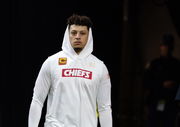
Prayers Pour In From Jordan Love & Co. as Cowboys Star Mourns Tragic Personal Loss
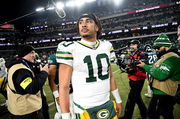
Justin Jefferson Makes Final Decision on Joining Buffalo Bills After Further Damaging J.J. McCarthy Relationship
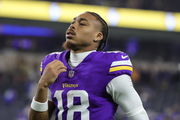
Matthew Stafford Makes Final Decision on Retirement After Narrowly Beating Drake Maye For NFL MVP

Troy Aikman Sends 3-Word Public Message to Roger Staubach as Cowboys Legend Reaches Personal Milestone
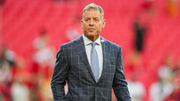
Big year ahead for Matthew Stafford
Year 17, and somehow, Matthew Stafford still feels like the most overlooked veteran in the league. No MVPs. No Offensive Player of the Year nods. Just one ring—though an unforgettable one. And yet, CBS Sports’ Jared Dubin didn’t hesitate: Stafford is “the most underrated quarterback in 2025.”
Why? “It’s easy to forget what Stafford can do when he’s afforded even remotely good protection… Even in his late 30s, Stafford can still sling it with the best of them.” And if you watched him with Puka Nacua last year, you’d probably agree. Stafford’s EPA per dropback, when Nacua was healthy, would’ve tied Jayden Daniels for eighth in the league.
ADVERTISEMENT
Now, with Davante Adams in and Cooper Kupp out, Stafford finally has another elite red zone threat—and one built for contested catches. It’s no small thing. Last season, the Rams were a playoff team despite ranking 25th in red zone touchdown percentage (51.4%) and 24th in points per trip. Stafford, for all his attempts, was 20th in red zone completion percentage and dead last in catchable throw rate among qualifying QBs. Simply put, the offense kept stalling where it mattered most.
Enter Adams, who led the league in red zone contested catch rate over the last three years. In Las Vegas, his fade-route efficiency didn’t always flash. But in Green Bay? It was a clinic. Sean McVay’s offense leaned on that same fade, remember 2021 vs. Cincinnati? But lacked a true target last season. Now, Stafford has that again. And with Terrance Ferguson in the mix too, don’t be shocked if the Rams go big when it gets tight.
The numbers are there. The weapons are there. It’s just the creativity that needs to click. Stafford threw 17 red zone touchdowns with zero picks in 2023. In 2021, he threw 32 red zone scores. If McVay uses Adams and Ferguson wisely, and Stafford stays upright, Year 17 might just be one of his finest yet.
ADVERTISEMENT
ADVERTISEMENT
ADVERTISEMENT
ADVERTISEMENT
.png)
.png)
.png)



